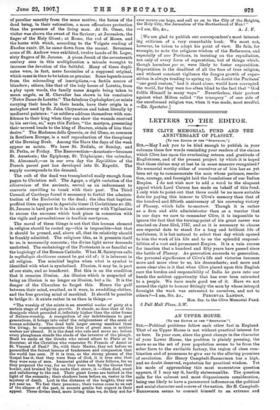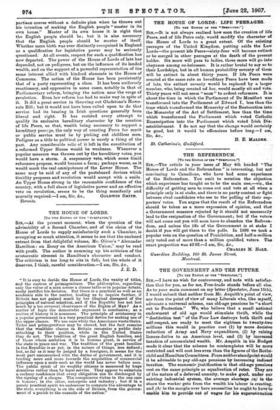AN UPPER HOUSE.
[To MR EDITOR or TER ..EPROTATOR.1 Sit,—Political problems follow each other fast in England. That of an Upper House is not without practical interest for us here. In your case, since the great change in the character of your Lower House, the problem is plainly pressing, the more so as the set of your population seems to be from the sober farm to the excitable factory, the region of class com- bination and of proneness to give ear to the alluring promises of revolution. Sir Henry Campbell-Bannerman has a high, and no doubt deserved, reputation for practical wisdom. Yet his mode of approaching this most momentous question appears, if I may say it, hardly statesmanlike. The question calls for the calmest and most dispassionate consideration, being one likely to have a paramount influence on the political and social character and course of the nation. Sir H. Campbell- Bannerman seems to commit himself to an extreme and partisan course without a definite plan when he throws out his intention of making the English people "master in its own house." Master of its own house it is right that the English people should be; but it is also necessary that the English people should be master of itself. Whether mere birth was ever distinctly recognised in England as a qualification for legislative power may be seriously questioned: At all events, respect for such a qualification has now departed. The power of the House of Lords of lete has depended, not on pedigrees, but on the influence of its landed wealth, and on the support of a powerful representation of the same interest allied with kindred elements in the House of Commons. The action of the House has been persistently that of a party representing a class. It has been uniformly reactionary, and oppressive in some cases, notably in that of Parliamentary reform, bringing the nation near the verge of revolution. Even law reform has had to make way in spite of it. It did a great service in throwing out Gladstone's Home- rule Bill; but it would not have been called upon to do that service had its bearing in Irish questions generally been liberal and right. It has resisted every attempt to qualify its exclusive hereditary character by the creation of life Peers, so that, wealth being necessary to support a hereditary peerage, the only way of creating Peers for merit or public service must be by picking out childless men. Pedigree as a title to political power is surely a thing of the past. Any considerable relic of it left in the constitution of a reformed Upper House would be weakness. Whenever a popular measure was thrown out by the hereditary votes, you would have a storm. A suspensory veto, which some timid reformers propose, would become a form; perhaps worse, as it would mask the real omnipotence of the Lower House. The same may be said of any of the pasteboard devices which timidity proposes and revolution would accept with a smile. An Upper House strong in the reasonable confidence of the country, with a full share of legislative power and an effective veto on revolution, seems to be the thing manifestly and
urgently required.—I am, Sir, &c., GOLDWIN SMITH. Toronto.











































 Previous page
Previous page